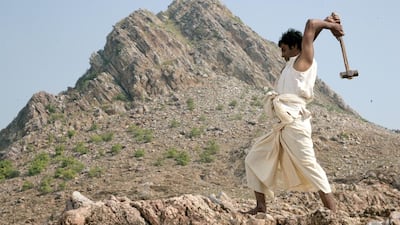Manjhi – The Mountain Man
Director: Ketan Mehta
Starring: Nawazuddin Siddiqui, Radhika Apte, Pankaj Tripathi Ruab, Gaurav Dwivedi, Ashraf Ul Haque, Jagat Rawat, Varadraj Swami
Two stars out of five
Director Ketan Mehta says Manjhi – The Mountain Man is "inspired" by the story of the real-life Dashrath Manjhi, not "based" on it, and therein lies the single biggest hint at what is to come in this otherwise marvellous undertaking.
Mehta and producers Nina Lath Gupta and Deepa Sahi had one of the most inspiring true tales of modern times to work with, and with the director’s background of handling sensitive and meaningful subjects, a lot was expected from this heavily promoted film.
Star Nawazuddin Siddiqui is definitely the highlight. The actor – best known for the 2012 films Gangs of Wasseypur 1 & 2, and more recently for playing Pakistani reporter Chand Nawab in Bajrangi Bhaijaan, which starred Salman Khan and was released last month – takes the title role in the latest biopic about India's "mountain man" of the 1960s. He plays Manjhi, a man from Gaya, India, who chiselled a path through a mountain over a period of 22 years armed with nothing more than force of will and a hammer and chisel.
Siddiqui is supported on screen by Radhika Apte, as Manjhi’s wife, Tigmanshu Dhulia, as a landlord, Gaurav Dwivedi, as a journalist, and the film’s co-producer Deepa Sahi as Indian prime minister Indira Gandhi. The inspiring tale of a man who worked so hard for so long to make it easier for people to travel from his village to the nearest town – after his wife died following an accident because it took too long for her to get medical help – sends out a great social message, albeit with too big a dose of melodrama.
In Manjhi, we can see Mehta – who won national Film Awards for his films Bhavni Bhavai in 1981 and Sardar in 1994, and has been lauded at various international film festivals including Nantes and Moscow – veer away from his trademark documentary-style filmmaking and try his hand at something a little bit more Bollywood.
Excessive dramatisation, a background score that screams for attention, and a curious injection of what seems to be CGI backgrounds were probably meant to add flair to the film, but end up taking something away.
Even the actors – some of the finest in India – let you down in places. When you see Deepa Sahi or Nawazuddin Siddiqui falter, you have to give them credit and assume that the fault probably lies more with the script or direction than with them.
In the end, Manjhi – The Mountain Man is an inspiring story of a man determined to fight against all odds. It is one that needed to be told, but perhaps it should have been told in a slightly different way.
While it will tug at the heartstrings of casual viewers with its emotional connect, it will make more seasoned movie buffs cringe a little due to the overwrought dramatics and the creative liberties that have been taken, which go a tad beyond what such a serious subject ideally calls for.
artslife@thenational.ae

